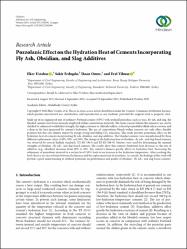Pozzolanic effect on the hydration heat of cements incorporating fly ash, obsidian, and slag additives
Künye
Ustabas, I., Erdogdu, S., Omur, I. & Yilmaz, E. (2021). Pozzolanic effect on the hydration heat of cements incorporating fly ash, obsidian, and slag additives. Advances in Civil Engineering, 2021, 2342896. https://doi.org/10.1155/2021/2342896Özet
Made up of an engineered mix of ordinary Portland cement (OPC) with artificial pozzolans such as trass, fly ash, and slag, the blended cements have been intensely employed within cementitious materials. The main reasons behind this intensive use can be clarified by enhanced workability/strength, the high resistance to chloride/sulfate, reduced permeability/alkali-silica reaction, and a drop in the heat generated by cement's hydration. The use of cementitious blends within concrete not only offers durable products but also cuts climate impact by energy saving and falling CO2 emissions. This study presents pozzolanic effect on the hydration heat of cements incorporating fly ash, obsidian, and slag additives. The blended cements were manufactured by three different replacement ratios of 20%, 30%, and 50%. The change in the hydration heat of obsidian-, fly ash-, and slag-based cements was observed by several Turkish standards (TS EN 196-8 and TS EN 196-9). Mortars were used for determining the uniaxial strengths of obsidian-, fly ash-, and slag-based cements. The results show that cement's hydration heat decreases as the rate of additives (e.g., obsidian) increases from 20% to 50%. The cement's fineness greatly affects its hydration heat. Increasing the refinement of pozzolanic material to a certain level (30%) leads to an increase in the hydration temperature. After reaching this level, there is no clear relation between the fineness and the replacement rate of pozzolans. As a result, the findings of this work will provide a good understanding of artificial pozzolans on performance and quality of obsidian-, fly ash-, and slag-based cements.


















